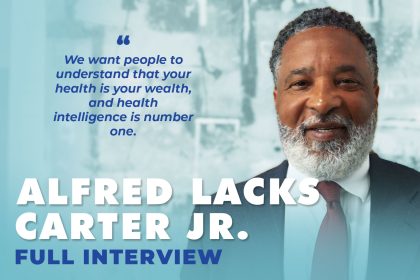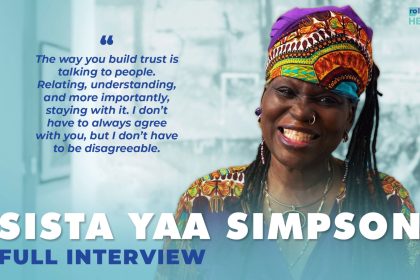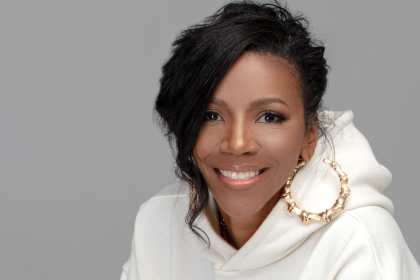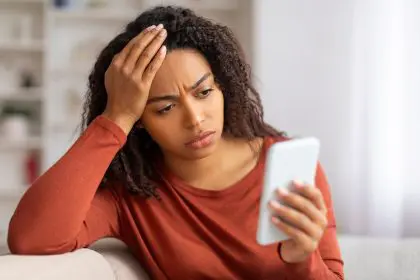Dr. Frank Barnes Jr. is a beacon of leadership and innovation in the field of optometry. With a career spanning more than four decades, Dr. Barnes has made significant strides in advancing eye care and health equity in the African American community. He received his Doctor of Optometry degree from the State University of New York, College of Optometry, and his BA in Chemistry from the College of the Holy Cross. As the president of the National Optometric Association and a panel provider for the New Jersey Commission for the Blind and Visually Impaired, Dr. Barnes continues to champion pathways and pipelines that bring more African Americans into the field of optometry.
In this insightful interview with Munson Steed on “Health IQ,” Dr. Barnes shares his journey, the importance of eye care, and his vision for the future of health equity.
Munson Steed: Welcome to Health IQ, where we introduce viewers to healthcare providers changing the dynamics, eradicating disparities, and increasing opportunities to raise health awareness for our entire community. I am proud today to talk with my dear brother, Dr. Frank Barnes regarding his vision for our community. Dr. Barnes, welcome to ‘Health IQ.’
Dr. Frank Barnes Jr.: Thank you. So very glad to be here with you and discussing the topics that are very important to us. So, thanks for having me and giving us this opportunity. I appreciate it.
MS: Please share with our audience what prompted you to enter this specialized field of optometry and eye care.
FB: Well, I started as a chemistry pre-med in undergrad. I was at Holy Cross in Worcester, Mass. An optometrist called me and introduced me to optometry and walked me through the process. I went on. When I got into optometry school, the school sent me to the National Optometric Association Convention in Houston, Texas, in 1983. When I got to the convention, I saw all these dynamic, strong, smart doctors and students who looked like me in one atmosphere. It was a mind-blowing experience.
They embraced me, they welcomed me, and [with] the feeling I left with when I returned to New York … I started the New York chapter, saying, “We have to have it here.” And when I got back, I was the only African-American in my class at the time, and I said, ‘Well, they said, we don’t have enough [optometrists]. I said, ‘All I need is one.’ Well, we started, and three freshmen came in. So, we started with our Fab 5.
So, 41 years later, I’m now the president of the National Optometric Association. I became a lifetime member in 1987, and I love what the organization stands for and does for the optometrists and for our community. I feel I’m a community doctor here in my community in Montclair, New Jersey. We provide eye care and healthcare services to our community. When we look at our numbers, meaning the people that look like me in the field of optometry that provide eye care for our community, it’s like 1.8 percent, a low number considering our population here in the US, which is 12 or 13 percent.
So, we want to reach those kinds of numbers of 12 or 13 percent in the optometry field, providing eye care to our community. A lot of times, if there’s only one or two, and that person dies, which does happen, nobody’s there to replace them. And so, you look down the road and say, ‘Well, who is going to replace them? If there’s not a pipeline of optometrists coming to our community, who’s going to be the one examining our children, our parents, or us? Who’s going to care about eye care? Who’s going to be familiar with eye care? What kind of relationship are we going to have with our eye doctors?’
And so, my job as the president of the National Optometric Association is to make sure that continues. We’re working on our top priorities: pipeline and pathways to optometry for minorities, specifically African-Americans, because that’s the foundation.
In 1969, the NOA was founded by Dr. C. Clane Powell in Atlanta, Georgia, a Morehouse man, and Dr. Howlette in Richmond, Virginia, [because] there was a need back in 1969, and that need is still here in 2024.
So, we started Pathways, Vision and Futures, here in the NOA. One of our priorities is to recruit African-Americans at HBCUs, male and female, from strong, academic, strong-minded, health-minded students that are interested in healthcare. We give them an option, and we help provide funding for them for the testing, like equipment in their first year in optometry school. We have also been trying to work with colleges of optometry to turn their recruiting eyes to HBCUs, where we have thousands of brilliant students ready to do something, and that could include optometry.
… My chairperson of the program went to Virginia State, and she’s in Virginia, so Hampton was one of the first schools that we got involved with. We also have a relationship with a school in Pennsylvania, the Pennsylvania College of Optometry. We have an articulated agreement to look at these students, and if they do well, and if they maintain their grades [they can attend] optometry school. We’re trying to expand that to other optometry schools.
MS: For those who are wondering, why is eye care important? We hear that the eyes are the pathway to the soul, but there’s so much that we don’t know.
FB: Thanks for that question. A lot of times when we think of the eye doctor, we think of people saying, ‘I don’t need glasses,’ or ‘I need glasses, or I have trouble driving at night. I have trouble reading a paper.’ … So, that’s the first thing that comes up because it’s a symptom that [we] realize, that [we] can’t see and do something about it. And so, they come to the eye doctor and get the eye examinations.
So, the first thing we think of is our vision. How are we seeing? How do we see so that we can drive safely for ourselves and the pedestrians on the street? And for a student in school, are they looking at the board? How are they reading? So, those vision portions are very important for learning and independent living. The other part is that we look at eye health. There are eye diseases that we look and see. Cataracts [which we may develop], as we get older, can cause a cloudiness of the lens of the eye that reduces our vision.
There’s glaucoma, where the pressure, that’s the fluid pressure inside the eye. How that fluid rotates in and out of the eye causes pressure to increase and cause damage to the nerve of the eye. So, the doctor’s checking that. It’s one of the leading causes of blindness. And then we go on to vision issues, to systemic health issues, like diabetes, and hypertension. Those things have a profound effect on our eyes. There can be bleeding in the eyes with a diabetic. You won’t know the person is bleeding unless you cut them open, but you can see it in the eyes without cutting them open because you can look directly at those blood vessels.
We can document how the person is responding. … These things are happening, but we can see it happening in the eyes. So, we know that this person has diabetes or hypertensive retinopathy and how to treat it. There are other conditions too that we pick up from the eyes. So, the window to your soul is a window to your health. We can start ahead of time to say, ‘Address this now because your eyes are giving you a hint that there’s a fire burning and it’s about to spread.’
So, let’s do something about it to get you to see well. And then there is also binocularity, which is how the eyes work together. Sometimes there’s an eye that turns out or turns in. People have cross eyes and they develop amblyopia, where the brain suppresses it, so they don’t see well out of that eye. So then, that reduces their processing, gathering the information so that they can process the information properly.
So, that affects your education and also how you work. You have to do something. You’re working harder to make up for an inefficient system. So, we try to diagnose that and do something called vision therapy. It’s like physical therapy for the eyes to get that binocularity working.
MS: What excited you about that particular organ, the eye?
FB: Well, I was chemistry pre-med, and I was thinking I was going into medical school. I thought I was going to be a surgeon. My mother’s a nurse. I grew up in the hospital. So, as I went through the program I did an externship in surgery at a doctor’s hospital. I realized I didn’t want to do surgery. I decided I was going to go into chemical engineering my senior year, but fortunately, an optometrist in Boston called me up and said, ‘I think you’ll like optometry.’
She found me through the GREs, the graduate record examinations. She called me, and sent me the information about it. I said, ‘this sounds good.’ It’s not bloody. I’m not a surgeon. I do minor surgery, not major surgery. … It was science, but it wasn’t the surgery portion.
So, I was able to enter healthcare without having to do surgery. With today’s technology, though, a lot of surgery is not done by the doctor, but it’s computerized. So, as you go right now, we have a bill in New Jersey to serve things that they call a YAG, a laser to use in a cataract, or if there’s an obstruction of the lens or with glaucoma, or if the fluid is not draining. We use drops for that to lower the pressure of YAG, but [we would be able] to use a laser to help that drainage, like a roto-rooter. You clear out the passageway and the fluid goes down. [We can] make it drain out that way, and help the fluid drain out of the eye to lower the pressure.
Those things are becoming available with technology in my field. And there’s no cutting and blood and all that kind of stuff. So, that’s a little bit more appealing for somebody that wants to go in the field because of technology. If you don’t want to be a surgeon, something else is computer-generated lasers. So, you don’t have to do that. So, surgery is becoming less surgical, and it’s expanding to our roles in our field, too. But from that, though, when I was graduating from college, I said, well, this sounds very interesting, the field of optometry, because it is science background and health background.
And so, I looked into it. And then once I looked into it, I got my eyes examined. I saw I had some eye coordination issues that were related. So, I got vision therapy, got me a pair of glasses, and then I started learning eye care. And as I was going through it, I began to appreciate optometry more and more, and saying how important vision is, and how interesting the eye was. And at one point, I was considered a low vision specialist. I did an externship at the Lighthouse, and I’ve worked with visually impaired people, people that suffer from glaucoma or macular degeneration, have lost sight, and surgery or medication is not going to do it anymore.
So, the job is to enhance their remedial vision so that they can live independently. So, there are special devices that we use for that. When I was doing that I saw people who had given up because their sight was gone, and they were now able to read something or see something, and perform and do something somewhat independently.
This man was as tall as me and strong. I saw him break down and cry when he was able to now see. It touched me. Or I have some people who have vision impairment, and they lost their job because transportation is difficult [because sometimes] they can’t drive. I create a bioptic telescope to let them see far, and they drive with special training, and they maintain their job. Or students who have retinitis pigmentosa, Stargardt’s disease, or macular degeneration, which it affects their vision. They can’t see. They have special devices so that they can see the board. Something reads for them, something magnifies so they can still perform like everyone else. It’s still more difficult, but they have a chance now. And you see the difference it makes in somebody’s life. That’s what I learned along the way, and that got me deeper, deeper, and deeper into optometry, saying this was the right field for me.
MS: Being president of the national organization, having seen the value of the association, how important is it for us to come together as a community to advocate for health equity?
FB: Extremely important. One voice screaming by itself can be ignored, but as a group, people listen. So, we need the numbers. We’re always trying to grow our membership and expand and spread the word out there because our community needs help. We have so many deficiencies in so many areas that we want to make sure we [address] one of those deficiencies in eye care as soon as we can. And so, that’s what’s important about the National Optometric Association. Our mission is eye care for our community, and we’re saving one eye at a time. So, that’s our goal.
MS: You are an amazing doctor. I appreciate the fact that you consider HBCUs a gold mine, and given the opportunity and access, you can change an entire community’s healthcare possibilities through your efforts. Thank you for that.
FB: My founder, C. Clane Powell, is a Morehouse man. And so, we’re looking to schools like that to put out brilliant scholars in all fields. We just want to let people recognize that and say, ‘Well, this is where they are.’ Look, we have to support those schools. Those schools give our students value, they value them tremendously. They come out with this strong foundation, and they’re so strong with the support that they can withstand some of society’s ills because they have a strong foundation. So, we have to realize that and recognize that and support our HBCUs and our organizations. We’ll all benefit from that. So, that’s my charge.











